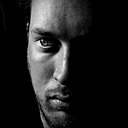I started my photographic journey using a hand-me-down 35mm film SLR that was manual focus only and once I clicked the shutter on that camera there was a sense of permanency to the image captured.
Once that shutter clicked and the film was wound on, that was it. If the exposure was off, or the focus was off then that was that. To some extent if you were developing the film yourself, you could use chemicals and techniques to achieve some basic level of adjustment, but if you messed up the exposure or the focus then the darkroom wouldn't save you.
To a large extent I contribute my understanding of exposure and how the camera captures the light in the scene to this early use of a film SLR. I think, back then, you made more of an effort to be careful to make sure not only the exposure settings were correct, but that the scene was indeed worth photographing in the first place. I feel like, there was more truth back then and that desire to capture the truth is something that has largely stuck with me over the years. To a large extent... I miss those days.
Modern digital camera, for all their benefits, in my mind, make it harder for people to learn and understand how it works and they just trust the camera to make the correct choices. The modern cameras and the ever increasing inclusion of in-body AI based "assistance", as well as the editing tools found in software these days make it all to easy to "fake" an image.
Is this bad? Perhaps not. It's art like another other art and open to the artists and the viewers interpretation.
